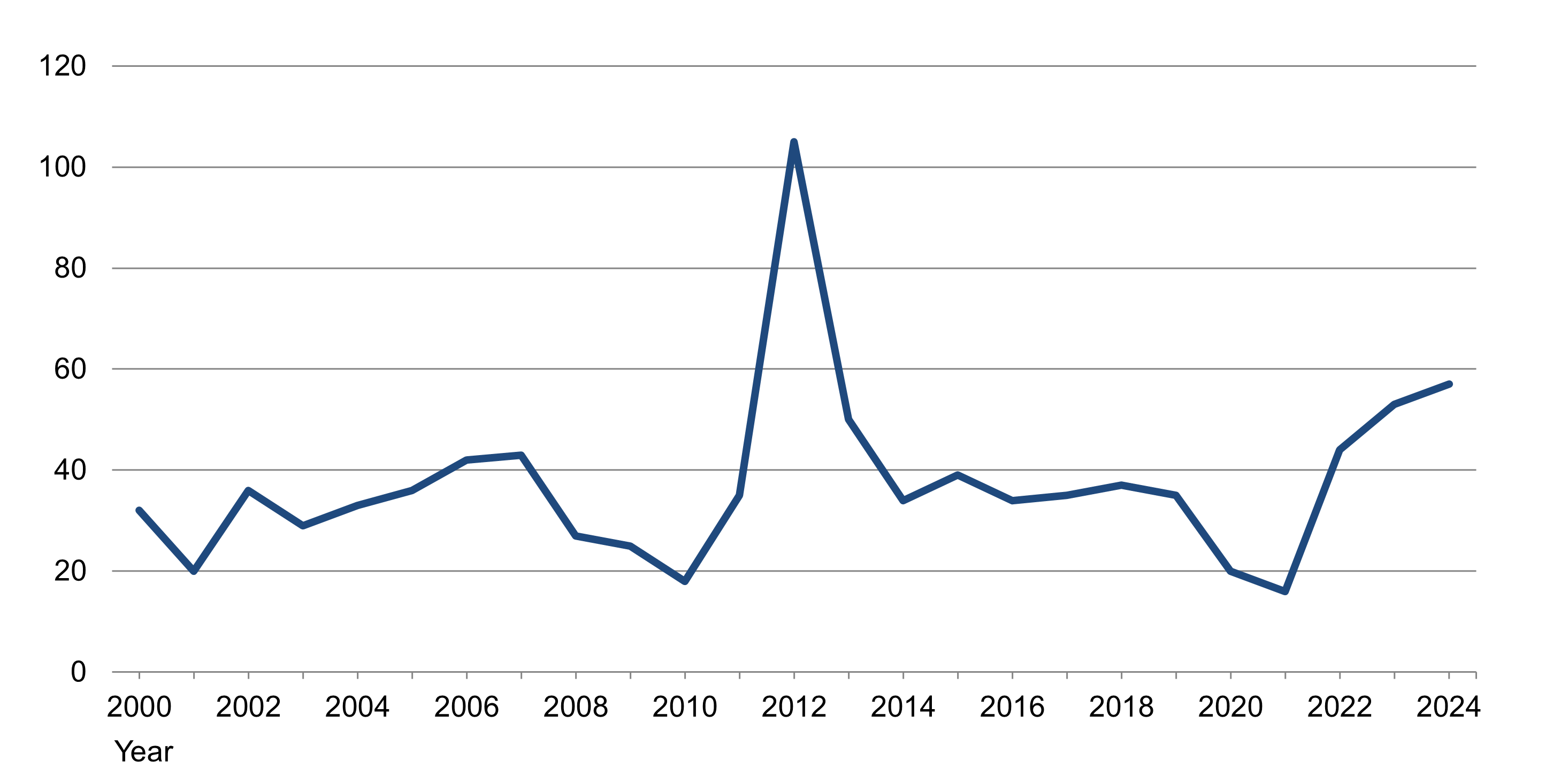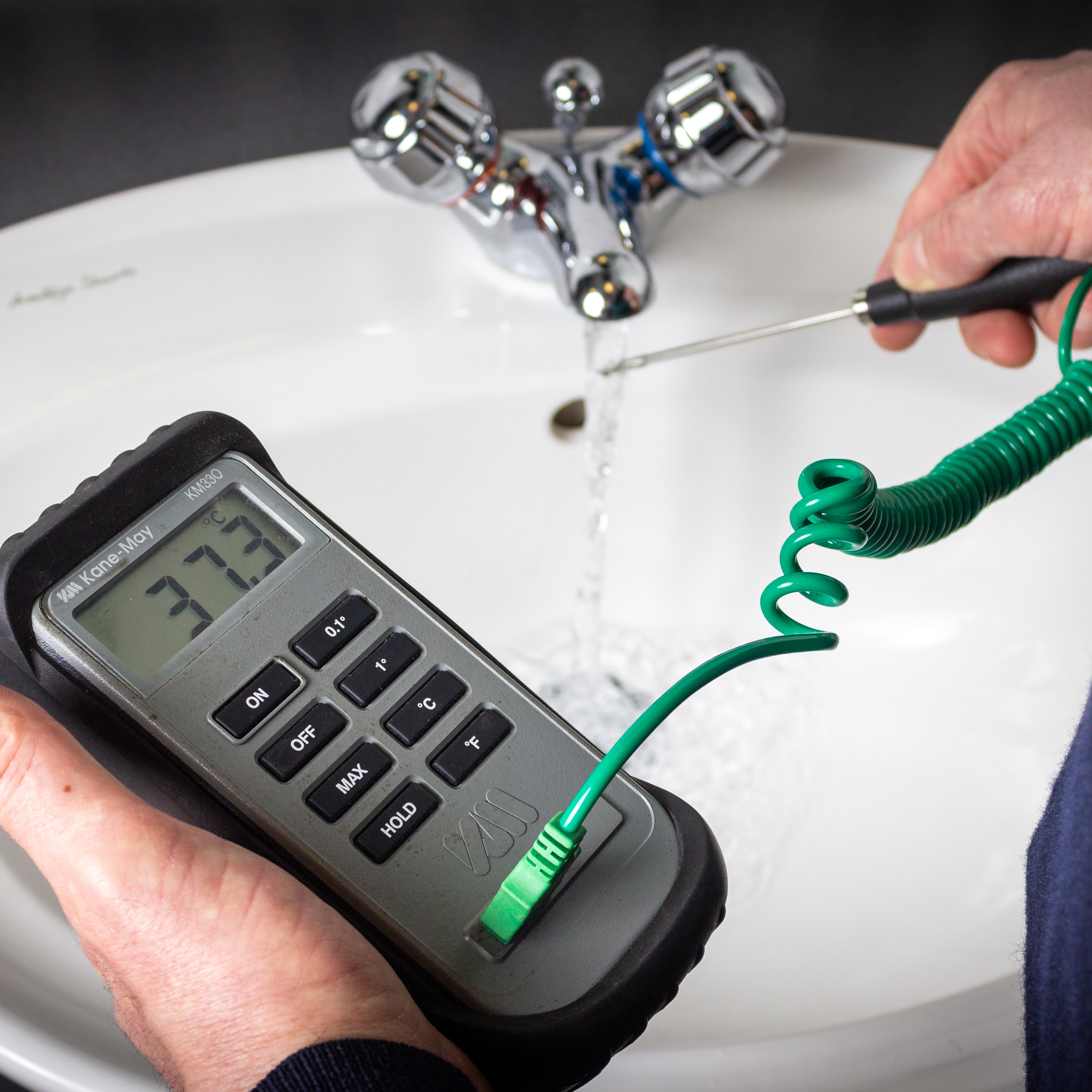Legionella is a life-threatening bacterium found in both natural and man-made water systems. While it may be present in many environments, it's the man-made water systems like those in offices, hospitals, and care homes that pose the greatest risk. This is because Legionella thrives in warm, stagnant conditions, making poorly managed systems a perfect breeding ground for the bacteria that can lead to Legionnaires' disease.
Recent outbreaks, such as those in New York, and a reported increase in cases across Scotland, highlight the critical need for vigilance. According to a 2024 Public Health Scotland report, the number of cases of Legionnaires' disease in Scotland increased by 7.5% in a single year, reaching the highest number on record outside of a specific outbreak in 2012.

Annual total of cases of Legionnaires' disease in Scotland, 2000 - 2024
Who’s at Risk?
Legionnaires' disease can cause a serious form of pneumonia that can be fatal. While anyone can be exposed, certain groups are particularly vulnerable, especially in hospitals and care homes. The disease disproportionately affects individuals over the age of 45, men more than women, and those with underlying health conditions, such as:
- Chronic respiratory disease (e.g., asthma, COPD)
- Weakened immune systems
- Heart Disease
- Kidney disease
- Smokers and heavy drinkers
The bacteria thrive in warm, stagnant water, making systems like hot and cold water supplies, cooling towers, and spa pools a common source of infection.
The Importance of Certified Training
At PPL Training, we understand that effective Legionella management goes beyond simple awareness. It requires a comprehensive understanding of the risks, legal responsibilities, and practical control measures. That's why we offer a suite of City & Guilds Assured and BPEC accredited Legionella (Water Hygiene) courses.
Our courses, including the Legionella Risk Assessment (WH004) and Water Sampling (WH0026), are specifically designed to meet a wide range of requirements, including ACOP L8 compliance. They are tailored for a variety of roles, from facilities managers and health and safety specialists to maintenance technicians and duty holders. The training covers:
- The medical aspects of Legionellosis and key case studies.
- A thorough review of legal and statutory responsibilities.
- Risk assessment in line with ACOP L8 and BS 8580.
- Identification of susceptible areas in high-risk water systems.
- Water sampling methods and documentation.
By providing both theoretical knowledge and practical, hands-on skills, we ensure that our delegates are not just compliant but competent. The risk assessment process is a vital first step, but without proper water sampling, the assessment is incomplete. Our courses reinforce these crucial principles, equipping your team with the knowledge and confidence to implement a truly effective water hygiene strategy.
Who Needs to Be Trained? A Guide for Duty Holders
In the UK, the management of Legionella is not just a best practice—it's a legal requirement. The Health and Safety Executive's Approved Code of Practice (ACOP) L8 places a clear responsibility on individuals and organisations to control the risk of Legionnaires' disease.
This is where the roles of the Duty Holder and the Appointed Responsible Person become critical.
- The Duty Holder: This is the individual or company with overall legal responsibility for a building and its water systems. This could be a landlord, a business owner, a director, or a facilities manager. The Duty Holder is not required to be a technical expert but must have a clear understanding of the risks and ensure that a proper management system is in place. Their key duty is to appoint a "Responsible Persons"
- The Appointed Responsible Persons: This is the individual designated by the Duty Holder to carry out day-to-day management tasks to control Legionella. This person must have sufficient knowledge, experience, and authority to do so effectively. They are responsible for tasks like conducting risk assessments, implementing control measures, and ensuring a written scheme is followed.
At PPL Training, our City & Guilds Assured Legionella courses are designed for these exact roles. We provide the essential knowledge needed for both the strategic-level Duty Holder and the hands-on
Responsible Persons.
Our training ensures that those with legal responsibilities for water systems are not just compliant, but competent to carry out their duties, protecting both their people and their business from a potentially fatal disease.
By providing training that covers everything from legal responsibilities to hands-on practical skills, we ensure that every person, from senior management to maintenance technicians, understands their role in safeguarding your systems.
Don't wait for a crisis to make sure your water systems are safe. By investing in certified training with PPL, you're not just ensuring compliance, you're proactively safeguarding your people, your assets, and your reputation. Our comprehensive courses provide the knowledge and practical skills needed to manage Legionella risks effectively.
Book your place today and take a proactive step toward a safer, more secure environment.











